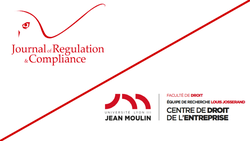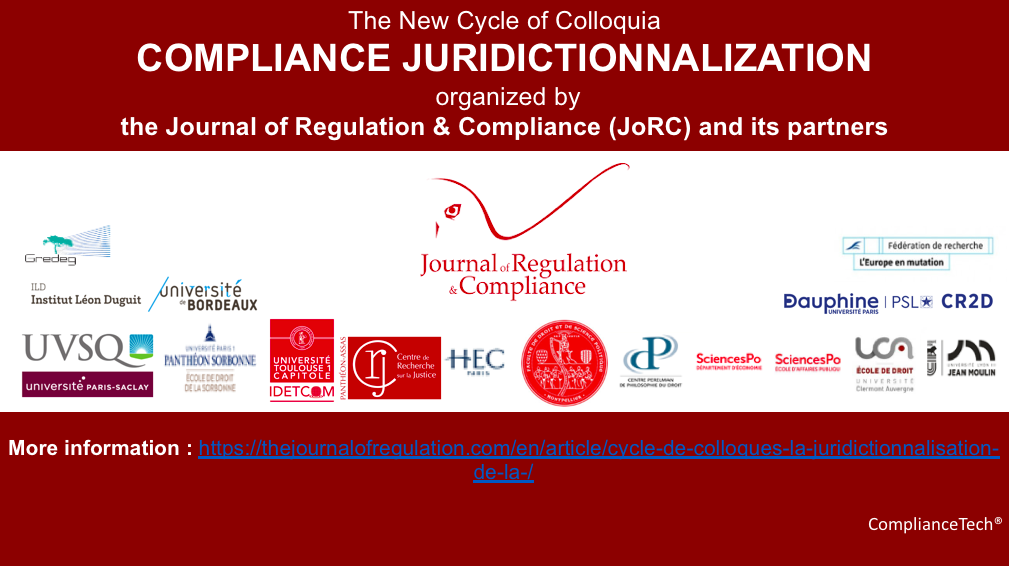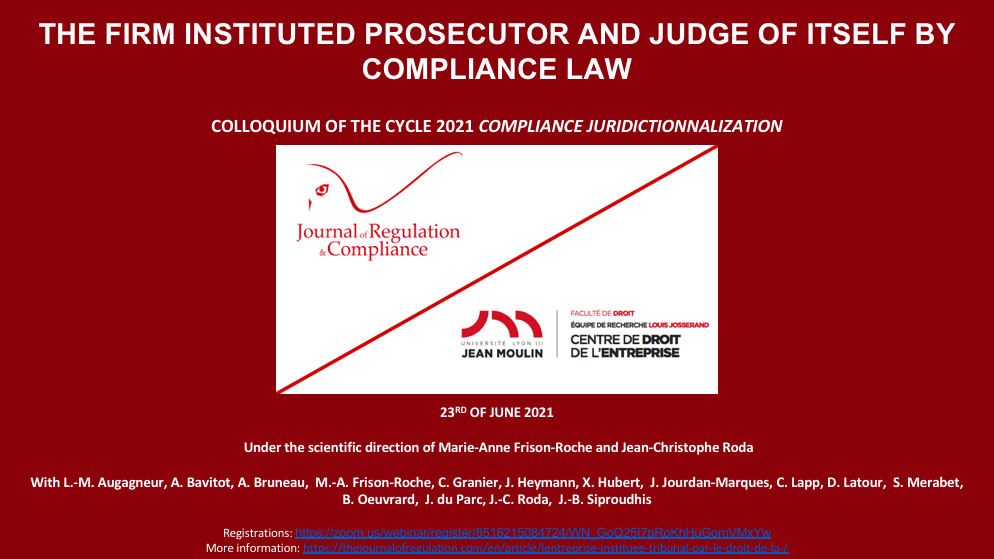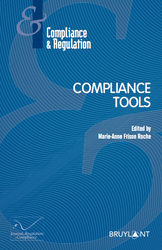The recent news

June 23, 2021
Organization of scientific events

This scientific manifestation is placed under the scientific responsibility of Marie-Anne Frison-Roche and Jean-Christophe Roda. It is organized by the Journal of Regulation & Compliance (JoRC) and the Centre de Droit de l'Entreprise of Lyon 3 University.
It is the fourth colloquium of the cycle of colloquia organized in 2021 around the general topic of Juridictionnalization of Compliance.


The different interventions will be then transformed into contributions in the books La juridictionnalisation de la Compliance and Compliance Juridictionnalization which will be published in the Regulation & Compliance serie, jointly published by the JoRC and Dalloz for the book in French and by JoRC and Bruylant for the book in English.
This colloquium will take place in Lyon 3 on 23rd of June 2021 with a limited audience. It will also be broadcasted in live on Zoom.
To register: https://zoom.us/webinar/register/8516215084724/WN_GoQ25I7pRoKhHuGomVMxYw
Presentation of the topic: Initially, it was through Criminal Law, inseparable from the trial, which forced companies to take charge of monitoring within themselves behavior likely to be deviant, the requirement of Ex Ante to be designed by the 'Ex Post of the jurisdictional. From this reversal of things, there has always remained this presence of the judge and the prosecution bodies in a Compliance Law which is nevertheless defined by its concern for the future and the Ex Ante tools within the company.
In doing so, the company becoming on the one hand a judge of itself, on the other hand a prosecutor of itself, it splits up, taking in reverse the most established procedural principles. Moreover, because of the monumental goals which constitute Compliance Law, companies become attorneys and judges of the others, or for the others, the cutting machines and the "supreme courts" being by name instituted to regulate in Ex Ante all different before that it does not become litigation. The Ex Ante of Compliance would then make the Ex Post disappear.
Method:
The colloquium which had to take place initially on 8th of April has been postponed to 23rd of June to enable speakers to meet and talk in face to face, with a limited audience.
These exchanges will be captured so that third parties can benefit from them, even before the publication of the works, La Juridictionnalisation de la Compliance and Compliance Juridictionalization, within which this work constitutes the basis for the development of a specific chapter.
Five practical cases will first be examined in five specific sectors, where this institution of the firm as prosecutor and judge of itself is particularly observable before both specific and more cross-sectoral themes are examined and discussed.
Will speak :
🎤Luc-Marie Augagneur, attorney before Lyon Court of Appeal, CVS Law Firm
🎤Alexis Bavitot, senior lecturer at Lyon 3 University
🎤Alain Bruneau, chief compliance officer at Natixis
🎤Jean-Marc Coulon, Head of Legal Infrastructure at Bouygues Construction
🎤Marie-Anne Frison-Roche, director of the Journal of Regulation & Compliance (JoRC)
🎤Cécile Granier, senior lecturer at Lyon 3 University
🎤Xavier Hubert, director of Compliance at Engie
🎤Jérémie Jourdan-Marques, professor at Lyon 2 University
🎤Jérémy Heymann, professor at Lyon 3 University
🎤Daphnée Latour, attorney before Paris Court of Appeal
🎤Christophe Lapp, founding partner of Altana law firm
🎤Samir Merabet, senior lecturer at Lyon 3 University
🎤Béatrice Oeuvrard, Public Policy Manager at Facebook France
🎤Jean du Parc, Bâtonnier
🎤Jean-Christophe Roda, professor at Lyon 3 University and director of the Centre de droit de l'entreprise (Center of Company Law)
🎤Jean-Baptiste Siproudhis, director Ethics, Integrity and CSR at Thalès

June 22, 2021
Publications

 Full Reference: Frison-Roche, M.-A., The Judge-Judge ; articulating words and things in the face of the challenging conflict of interest born by Compliance Law, Working Paper, June 22, 2022.
Full Reference: Frison-Roche, M.-A., The Judge-Judge ; articulating words and things in the face of the challenging conflict of interest born by Compliance Law, Working Paper, June 22, 2022.
____
🎤 This Working Paper had been made to prepare a conference (done in French).
This conference took place in the Academic Colloquium, L'entreprise instituée Procureur et Juge d'elle-même par le Droit de la Compliance, in Lyon, the 23rd June 2021.
____
📝this Working Paper is the basis of an article to be published
📕 in its French version in the book La juridictionnalisation de la Compliance, in the Series 
📘 in its English version in the book Compliance Juridictionnalisation, in the Series 
____
► Working Paper Summary: Puisque le thème de cette réflexion générale sur L'entreprise instituée Juge et Procureur d'elle-même par le Droit de la Compliance porte sur un ensemble d'autres réflexions soucieuses de l’ajustement des mots et des choses, la façon dont le rapport entre les uns et les autres évoluent, ce travail va porter sur la question de savoir si cette évolution est radicale ou pas, lorsqu'on parle de "juge".
Car, "juger" c'est un mot que le Droit a disputé à d'autres discipline!footnote-2090s, mais qu'il s'est approprié pour non pas tant avoir davantage de pouvoirs, par exemple celui de surveiller et de punir, mais au contraire s'imposer des limites, puisqu'à celui qui juge il a mis aux pieds les chaines de la procédure, ce qui rend supportable pour l'autre un tel pouvoir exercé!footnote-2091. C'est pourquoi ceux qui veulent le pouvoir de juger voudraient souvent n'en avoir pas le titre, car avoir de jure le titre de juge c'est être soumis au régime corrélé, c'est se soumettre à l'exactitude procédurale.
Le Droit repère qui juge et oblige ce si-puissant à la procédure. Mais il a aussi le pouvoir d'instituer juge et tous les personnages du procès. Il le fait d'ordinaire avec clarté en distinguant les uns des choses. C'est si important que ce conseil a valeur constitutionnelle. Ainsi, non seulement celui qui juge doit être nommé ainsi mais l'appareillage procédurale qui va avec le personnage et qui constitue à la façon une façon de faire et des droits fondamentaux, ne sont pas "concédés" par bonté ou dans un second temps : c'est un bloc. Si l'on ne voulait pas avoir à supporter les droits processuels, il ne fallait vouloir être juge. Certes on pu en conclure que la procédure serait donc devenue "substantielle" ; par cette élévation, il s'agit plutôt de dire que la procédure ne serait plus une "matière servante": c'est une sorte de déclaration d'amour pour la procédure, tant qu'on affirme qu'à l'acte de juger, d'enquêter ou de poursuivre, sont "naturellement" attachées les droits pour celui qui risque d'en être l'objet.
Le Droit de la Compliance, à la recherche d'alliés pour atteindre les Buts Monumentaux pour l'atteinte desquels il a été institué, va requérir, voire exiger d'entreprises privées qu'elle aillent elles-mêmes rechercher, c'est-à-dire enquêter, des faits susceptibles de lui être reprochés. Le Droit de la Compliance va aussi exiger qu'elles poursuivent les personnes ayant commis ces faits. Il va encore exiger qu'elles sanctionnent les faits que des personnes ont commis en son nom.
On le comprend bien du point de vue de l'efficacité Ex Ante. La confusion est souvent très efficace. Par exemple il est plus efficace que celui qui poursuit soit aussi celui qui instruise et qui juge, puisqu'il connait bien le dossier. D'ailleurs il est plus efficace qu'il prenne aussi les règles, ainsi il connait mieux que quiconque "l'esprit" des textes. Cela fut souvent souligné en Droit de la Régulation. Mais tout cela ne va pas de soi.
Pour deux raisons, l'une extérieur et l'autre intérieure.
La première raison, extérieure, tient que l'on ne pourrait pas "nommer" juge qui ne l'est pas. Cela serait trop facile, car il suffirait alors de désigner quiconque, voire de le faire soi-même pour s'approprier le régime qui va avec, pouvoir notamment d'obtenir qu'autrui obéisse alors même qu'il n'est pas subordonné ou qu'il transmette des informations, alors même qu'il serait concurrent : il faudrait alors rappeler seul le juge pourrait se nommer juge ! et dans ce temps nouveau, voilà que des entreprises seraient juges, procureurs, enquêteurs ! Les temps seraient donc si graves et en si grand désordre qu'il faudrait en revenir à cette tautologie là... !footnote-2092 Mais sommes-nous dans une telle radicalité ? D'ailleurs, les juges ont-ils "l'apanage" du jugement et le Droit n'admet-il pas cela depuis longtemps ? Dès l'instant que la procédure est là en Ex Ante et le contrôle du juge en Ex Post ?
La seconde raison, interne à l'entreprise, tient à ce que l'entreprise enquête sur elle-même, se juge elle-même, se sanctionne elle-même. Or, la personne morale n'exprimant sa volonté qu'à travers soit ses organes, l'on souligne en pratique les difficultés pour un même être humain de formuler des griefs, en tant qu'il est le mandataire de la personne morale, à la personne physique qu'il est lui-même. Les deux intérêts des deux ne sont pas les mêmes, sont souvent opposés, et comment les secrets de l'un peuvent être tenus à l'égard de l'autre. C'est tout le mystère, voire l'artifice de la personnalité morale qui apparaît et l'on comprend mieux que le Droit de la Compliance ne veut plus utiliser cette notion étrange. Car toues les règles de procédure ne peuvent masquer que se poursuivre soi-même n'a pas plus de sens que de contracter avec soi-même. Ce conflit d'intérêts est impossible à résoudre car nommer un même individu x puis le nommer y, en déclarant ouverte la dispute entre eux n'a pas de sens.
Ce dualisme impossible à admettre dès l'instant qu'il s'agit de faire jouer ces fonctions à l'égard des mandataires sociaux peut retrouver vie en instituant des tiers de confiance qui vont porter les secrets et les oppositions. Par exemple par la désignation de deux avocats distincts par l'être humain mandataire et l'être humain dirigeant, chaque avocat pouvant avoir des secrets l'un pour l'autre et s'opposer l'un à l'autre. Ces espaces de reconstitution des oppositions si "naturelles" en procédure entre celui qui juge et celui qui est jugé peuvent aussi avoir prendre la forme technologique des plateformes : là où il n'y a plus personne, là où le process a remplacé la procédure, il n'y a plus non plus de jugement humain. L'on mesure ainsi que la crainte des conflits d'intérêts est si forte que l'on se résigne à dire que seule la machine serait "impartiale", dérisoire conception de l'impartialité contre laquelle il convient de lutter.
Cela permet alors d'aboutir à une dernière question : l'entreprise peut-elle prétendre exercer le pouvoir juridictionnel de poursuivre et de juger et d'enquêter sans même se prétendre ni procureur, ni juge d'instruction, ni tribunal ? L'avantage serait de pouvoir se soustraire au régime juridique que le Droit classique attache à ses mots-là, principalement les droits de la défense, les droits d'action et le principe de publicité de la justice. Quand Facebook dit "réagir" à la décision du 5 mai 2021 adoptée par ce qui ne serait qu'un Oversight Board pour décider pourtant "en conséquence" une suspension de 2 ans du compte de Donald Trump, l'art des qualifications semble être utilisé afin d'éviter toute contrainte de régime. Mais cet art de l'euphémisme est bien ancien. Ainsi les Etats, lorsqu'ils voulurent accroître la répression, présentèrent la transformation du système comme un adoucissement de celui-ci à travers la "dépénalisation" du Droit économique, transféré des tribunaux correctionnels aux AAI. L'efficacité en fût grandement accrue, puisque les garanties de la procédure pénales ont cessé de s'appliquer. Mais 20 ans plus tard, les mots retrouvèrent leur chemin vers les choses : sous le Droit pénal, dormait la "matière pénale", qui requière la même "impartialité". Un juge un jour l'affirma et tout fut changé. Attendons donc ce qu'en diront les Cours, puisqu'elles sont les maîtres des qualifications, comme le dit l'article 12 du Code de procédure civil, qu'écrivit Motulsky.
Updated: June 14, 2021 (Initial publication: June 11, 2021)
Interviews

► Full reference : Frison-Roche, M.-A., "The European Public Prosecutor's Office is a remarkable contribution to Compliance Law" (« Le parquet européen est un apport considérable au droit de la compliance »), interview with Olivia Dufour, Actu-Juridique, June 11 and 14, 2021.
💬 Read the interview (in French)
❓ Questions asked (translated by us) :
- Actu-Juridique : In an article published on LinkedIn, you seemed very enthusiastic concerning the creation of the European Public Prosecutor's Office. This Prosecutor's Office seems likely to reinforce the fight against economic delinquency, but is not it strange a prosecution without a State?
- Actu-Juridique : You consider that it is a great progress for Compliance, why?
- Actu-Juridique : Why ex ante ? The justice generally intervenes in ex post ?
- Actu-Juridique : There still is a limit, it is the sovereignty of States which can refuse this prosecutor...
- Actu-Juridique : Let's come back to Compliance, to what extent it will gain in efficiency?
- Actu-Juridique : A prosecutor without Sate, omnipotent prosecutors, the end of the distinction between pursuit and investigation... all of this seems to disregard defense rights!
_______
June 2, 2021
Publications

Full Reference: Frison-Roche, M.-A., Training: content and container of Compliance Law, in Frison-Roche, M.-A. (ed.), Compliance tools, series "Régulations & Compliance", Journal of Regulation & Compliance (JoRC) and Bruylant, 2021, p. 245-264
___
Summary of the article
Firstly, as Training is a specific Compliance tool, it is supervised by Regulators. It becomes mandatory when it is contained in Compliance programs or sanction decisions. Since effectiveness and efficiency are legal requirements, what is the margin of companies to design them and how to measure the result?
Secondly, as long as each Compliance tool includes, more and more, an educational dimension, we can take each of them to identify this perspective. So even condemnations and prescriptions are so many lessons, lessons given, lessons to be followed. The question is then to know who, in this so pedagogical Compliance Law, are the "teachers"?
____
This article is based on a bilingual Working Paper, including additional technical developments, pop-up notes and hypertext links.
Consult an overview of the volume in which the article was published.
____
June 2, 2021
Publications

Full Reference : Frison-Roche, M.-A..,Rights, primary and natural Compliance Tools, in Frison-Roche, M.-A. (ed.), Compliance Tools, series "Régulations & Compliance", Journal of Regulation & Compliance (JoRC) and Bruylant, 2021, p. 319-342
___
Article Summary: In the traditional conception of the architecture of the sectors regulated by Law, and in Compliance Law which extends the regulatory techniques, rights have little place. But this configuration no longer takes place; on the contrary, rights are at the center of Regulatory and Compliance systems, and will be more and more so. They are and will be the primary tools of Compliance Law because they constitute a very effective "tool" to ensure the entire functioning of a system whose goals are so difficult to achieve. Because every effort must be done to achieve these goals, the public authorities not only rely on the power of crucial operators, but also distribute prerogatives to people and organizations who, thus encouraged, activate the Compliance system and participate in the achievement of the "monumental goal". Rights can prove to be the most effective tools for actually achieving the goals set, so much so that they can be seen as "primary tools".
But it is pertinent to have more pretension and to conceive rights as the most "natural" tools of Compliance Law. Indeed because all the Monumental Goals by which Compliance Law is defined can be expressed by the protection of persons, that is to say to the effectiveness of their prerogatives, by a mirror effect between rights. given as tools by Law by to persons and rights which constitute the very goal of all Compliance Law, in particular the protection of all human beings, even if they are in a situation of great weakness, rights becoming a "natural tool" of Compliance Law.
We are only at the beginning of their deployment and it is undoubtedly on them that Digital space in which we now live would be regulated, so that we will not suffocated there and that it will constitute for people a civilized space.
____
Read the General Presentation of the book in which this article has been published
____
June 2, 2021
Publications

► Full reference : Frison-Roche, M.-A., Building by Law the Unicity of Compliance Tools from the Definition of Compliance Law by its "Monumental Goals", in Frison-Roche, M.-A. (ed.), Compliance Tools, serie "Régulations & Compliance", Journal of Regulation & Compliance (JoRC) and Bruylant, 2021, pp. 35-46
Summary of the article : The "tools of Compliance" do not stack on top of each other. They form a system, thanks to a unity drawn from the goals that all these multiple and different tools serve: the "Monumental Goals" by which Compliance Law is defined.
All these tools are configured by these goals and for mastering all these techniques, it is essential to put them all in perspective of what Compliance Law is, which is designed teleologically with regard to its goals. Extension of Regulatory Law and like it, Compliance Law is built on a balance between the principle of competition and other concerns that public authorities claim to take care of. Compliance Law has moreover more "pretensions" in this respect, for example in environmental matters. All the means are then good, the violence of the tools marrying without difficulty with the voluntary commitments since it is the goals which govern this branch of Law.
As legal solutions adopted show, a common method of interpretation and common levels of constraint for all Compliance Tools result from this definition. Starting from the goals (in which legal normativity is housed), the interpretation of the different tools is thus unified. Moreover, the different degrees of constraint do not operate according to the consideration of sources (traditional legal criterion) but by the goals, according to the legal distinction between obligations of means and obligations of results which result from the articulation between tools, of which the establishment is an obligation of result, and the goal, of which the achievement is only an obligation of means.
____
📝 Read the bilingual working paper on which rely this article.
📝 Read a general presentation of the book in which this article has been published.
____
June 2, 2021
Publications

General reference : Frison-Roche, M.-A., Drawing up Risk Maps as an Obligation and the paradoxe of the "Compliance Risks", in Frison-Roche, M.-A. (ed.), Compliance Tools, serie "Régulations & Compliance", Journal of Regulation & Compliance (JoRC) and Bruylant, 2021, p. 61-72
___
Summary of the article :
There are few synthetic or theoretical studies on Risk Mapping even though it is in fact the Compliance central tool, perhaps because it is more a management tool than a legal one. Risk Mapping is often described but does not receive any other legal qualifications than being a "modality", suffering in this respect from an evil which affects the whole of Compliance, still little understood by Law, attention often so focused on the Ex Post (sanctions) while Compliance is by nature in the Ex Ante. Going from disarray to incomprehension, everyone can note the existence of "compliance risks" among the mapped risks, because if as so many affirm that it would be necessary to speak only of simple conformity as obedience, demonstrated in Ex Ante, to Law, how a sub-set of a tool would therefore have the same object as the set of Law that this tool serves ... This aporia can only be resolved if Compliance Law is defined substantially by its "monumental goals" which exceed obedience to regulations.
Consequently, Law taking up Risk Mapping, this mechanism may first appear as an ancillary obligation to the main obligation consisting in achieving "monumental goals". The ancillary obligation to draw up the maps is an obligation of result, while the main obligation to achieve the monumental goals is an obligation of means. These cartographies being very diverse and being only occasionally targeted by specific laws, it can also constitute only a legal fact or, through the play of various charters, a unilateral legal commitment. But it isnbecoming the basis of an autonomous legal obligation incumbent on enterprises in position to know certain risks, obligation referring to the existence of a subjective right tof knowing and measuring them ("right to be worried") which the third parties who are going to run them would hold, thus allowing them to choose to run them, or not.
____
Read a general presentation of the book in which the article is published
____
June 2, 2021
Publications

Full Reference: Frison-Roche, M.-A. (ed.), Compliance Tools, serie "Régulations & Compliance", Journal of Regulation & Compliance (JoRC) & Bruylant, 2021.
This book in English is the first title of this collection integrally dedicated to Compliance Law, in that it is the extension of Regulation Law.
Read the titles of this series in English co-published by Bruylant.
This collection in English is articulated with a collection co-published between the Journal of Regulation & Compliance and Dalloz.
Thus, in parallel, a book in French, Les Outils de la Compliance is published.
Read the titles of the series in French co-published with Dalloz.
This book is published after a cycle of colloquiums organised by the Journal of Regulation & Compliance (JoRC) and Partners Universities.
___
General Presentation of the collective book
The political dimension of Compliance Law lies in the goals it aims to achieve. To achieve them, the concern for these goals is internalized in "crucial operators", which may be obliged to concretize "monumental goals" set by public authorities. These public bodies control the Ex Ante reorganization that this implies for these companies and sanction Ex Post the possible inadequacy of the companies, which have become transparent to this end. The effectiveness and efficiency of this internalization, without which the statement of these goals is worth nothing, is based on the Compliance tools that are deployed.
These appear to be very diverse but their substantial unity (topic which will be the subject of a forthcoming book) makes it possible to study the tools put in place from a unique perspective, by not isolating them in a particular branch of Law, Criminal law or International Law for example, but by measuring what is common to them, notably Anticipation, Trust, Commitment, Responsibility, Incentive, and so on. If the Compliance tools vary, it is rather not only according to the sectors, finance and banking appearing then as the advanced point of the general Compliance Law, for example in environmental matters, but also according to the countries and the cultures. It is in fact about them that legal cultures seem to oppose.
The book aims to understand these "tools" by going beyond the description of each instrument, for which we already have many monographs, for analyzing them through the issues of Risks, required Expertises, Training. Sovereignty claims, Incentives, mechanical aptitude of Technologies. It is through these themes that are analyzed by the authors, experts in the field, what we always want to understand better: Compliance Programs, Whistle blowing, Mapping, Sanctions, Extraterritoriality, etc.
____
Read the summary of the book.
Read the foreword, summarizing all the contributions.
Présentation of the book contributions:
-
Amico, Th., Compliance or the passage from ex post to ex ante: A Copernican revolution for the criminal lawyer?
-
Banck, A., The maturity of the Compliance tool’s user, first criterion of the choice of the salient tool
- Burlingame, Coppens R., Power, N, Lee, D.H., Anti-Corruption Compliance: Global Dimension of Enforcement and Risk Management
-
Calandri, L., Incentive(s) and Self-Regulation(s): which place for Compliance Law in the Audiovisual Sector?
-
Causse, H., Compliance Training: Through and Beyond Traditional Legal Training
- Frison-Roche, M.-A., Describing, designing and correlating Compliance Tools to have a better use of it
-
Frison-Roche, M.-A., Building by Law the Unicity of Compliance Tools from the Definition of Compliance Law by its "Monumental Goals"
- Frison-Roche, M.-A., Drawing up Risk Maps as an obligation and the paradox of the "Compliance risks"
- Frison-Roche, M.-A., Incentives and Compliance, a couple to propel
- Frison-Roche, M.-A., Resolving the contradiction between sanctions and incentives under the fire of Compliance Law
- Frison-Roche, M.-A., Rights, primary and natural Compliance tools
-
Frison-Roche, M.-A., Training: content and container of Compliance Law
-
Galland, M., The Regulator's Inspection of the Effectiveness of the Compliance Tools Implemented by the Company
- Granier, C., The Normative Originality of Compliance by Design
-
Guillaume, N., Compliance risk mapping: first insights of challenges, limits and good practices
-
Guttierez-Crespin, A., Audit of Compliance Systems
-
Koenigsberg, S. and Barrière, F., The Development of Attorney's Compliance Expertise
-
Larouer, M., The Manifestation of Incentives Mechanisms in French Compliance Law
-
Merabet, S., Morality by Design
-
Pailler, L., Technological Tools, Compliance by Design and GDPR: the Protection of Personal Data from Design
-
Racine, J.-B., Geographical dominance in the choice and the use of Compliance Tools. Introductory remarks
-
Rapp, L., Incentive Theory and Governance of Space Activities
-
Roda, J.-C., Compliance by design in antitrust: between innovation and illusion
-
Salah, M., Conception and Application of Compliance in Africa
-
Tardieu, H., Data Sovereignty and Compliance
-
Thouret, T., Training and Compliance, Two Correlated Information Transmission Tools